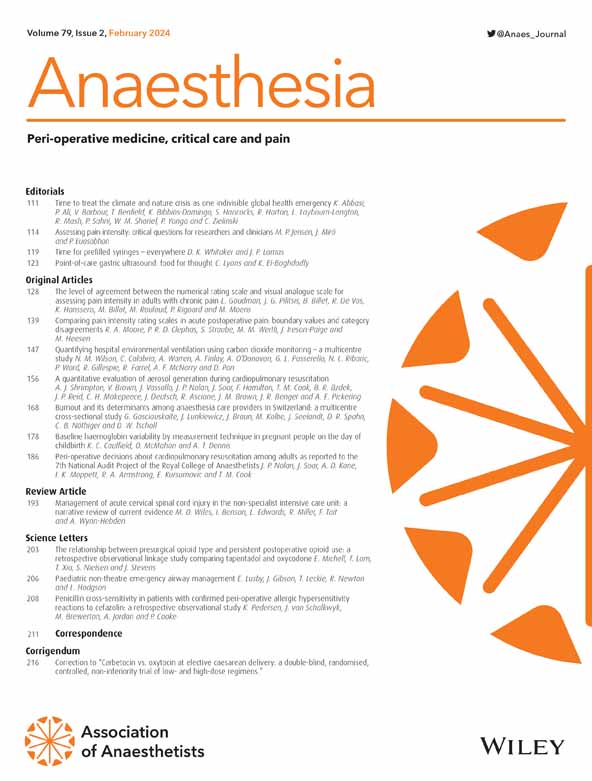术前右美托咪定鼻喷雾剂和接受耳鼻喉手术的成人出现性激动:一项随机对照试验
IF 6.9
1区 医学
Q1 ANESTHESIOLOGY
引用次数: 0
摘要
耳鼻喉手术后出现性躁动很常见,引起患者不适并增加并发症的风险。我们假设术前右美托咪定鼻喷雾剂可以减少接受这些手术的成年患者出现躁动的发生率。方法采用随机双盲对照试验,纳入接受耳鼻喉外科手术的成人患者。在诱导前30分钟,患者按1:1比例接受右美托咪定(75 ~ 100 μg,根据年龄和体重)或0.9%生理盐水鼻腔喷雾。七氟醚麻醉滴定至双谱指数40-60。主要观察指标是出现性躁动的发生率(七氟醚停药至拔管后5分钟,Riker镇静躁动量表评分≥5)。结果我们招募了159例患者(中位(IQR[范围]),年龄50岁(36-60岁[18-77]);62%的男性)。右美托咪定组患者出现躁动的发生率为25%(20/80),而0.9%生理盐水组为47% (37/79)(RR 0.53, 95%CI 0.34-0.82, p = 0.004),需要治疗的人数为4.6。次要和探索性结果显示,右美托咪定鼻喷雾剂与:减少静脉穿刺疼痛相关;术后第一晚睡眠障碍发生率降低;更高的患者满意度,没有增加不良事件。术前右美托咪定鼻喷雾剂可减少接受耳鼻喉外科手术的成年患者出现的焦虑,并可加强这些手术的围手术期护理。本文章由计算机程序翻译,如有差异,请以英文原文为准。
Pre-operative dexmedetomidine nasal spray and emergence agitation in adults undergoing ear, nose and throat surgery: a randomised controlled trial.
INTRODUCTION
Emergence agitation is common after ear, nose and throat surgery, causing patient discomfort and increased risk of complications. We hypothesised that pre-operative dexmedetomidine nasal spray would reduce the incidence of emergence agitation in adult patients undergoing these procedures.
METHODS
We conducted a randomised double-blind controlled trial in adults scheduled for ear, nose and throat surgery. Patients were allocated (1:1) to receive nasal spray with dexmedetomidine (75-100 μg based on age and weight) or 0.9% saline, 30 min before induction. Sevoflurane anaesthesia was titrated to bispectral index 40-60. The primary outcome was the incidence of emergence agitation (Riker sedation agitation scale score ≥ 5 from sevoflurane discontinuation to 5 min post-tracheal extubation).
RESULTS
We recruited 159 patients (median (IQR [range]) age 50 (36-60 [18-77]) y; 62% male). The incidence of emergence agitation in patients allocated to the dexmedetomidine group was 25% (20/80) compared with 47% (37/79) in those allocated to the 0.9% saline group (RR 0.53, 95%CI 0.34-0.82, p = 0.004), with a number needed to treat of 4.6. Secondary and exploratory outcomes showed that dexmedetomidine nasal spray was associated with: less venepuncture pain; reduced rate of sleep disturbance on the first night after surgery; and higher patient satisfaction, without increasing adverse events.
DISCUSSION
Pre-operative dexmedetomidine nasal spray reduced emergence agitation in adult patients undergoing ear, nose and throat surgery, and could enhance peri-operative care for these procedures.
求助全文
通过发布文献求助,成功后即可免费获取论文全文。
去求助
来源期刊

Anaesthesia
医学-麻醉学
CiteScore
21.20
自引率
9.30%
发文量
300
审稿时长
6 months
期刊介绍:
The official journal of the Association of Anaesthetists is Anaesthesia. It is a comprehensive international publication that covers a wide range of topics. The journal focuses on general and regional anaesthesia, as well as intensive care and pain therapy. It includes original articles that have undergone peer review, covering all aspects of these fields, including research on equipment.
 求助内容:
求助内容: 应助结果提醒方式:
应助结果提醒方式:


